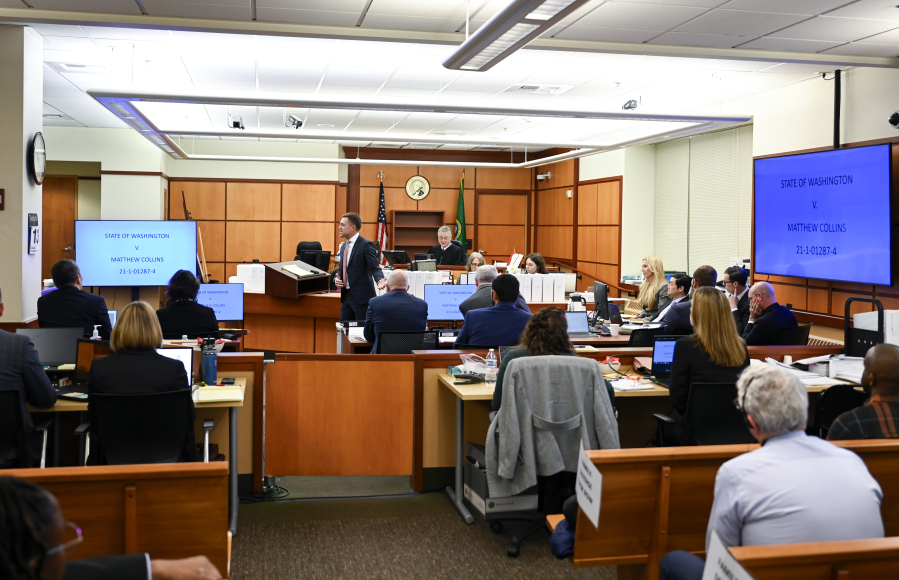TACOMA — A police officer who was under investigation for more than a year but ultimately wasn’t charged with causing the death of Manuel Ellis testified Wednesday that his patrol partner, who was charged, did nothing wrong the night of the fatal struggle.
Tacoma police Officer Masyih Ford’s testimony at times benefited his former partner Timothy Rankine’s defense more than Rankine’s own statement to detectives. But some of Ford’s testimony undercut the defense of Rankine’s two co-defendants.
Ford, 31, was one of approximately 20 law enforcement officers who responded to the South Tacoma scene on the night Ellis died in March 2020. He helped control Ellis’ legs during the prolonged restraint that, according to an autopsy, killed Ellis.
Ford was placed on paid leave by the Tacoma Police Department and investigated for more than a year before prosecutors from the Washington Attorney General’s Office elected not to charge him in Ellis’ death.
Rankine, 34, is charged with first-degree manslaughter and officers Matthew Collins, 40, and Christopher “Shane” Burbank, 38, face charges of second-degree murder and first-degree manslaughter — the first time in 85 years three officers in Washington state have faced charges for an in-custody death.
All three have pleaded not guilty, are free on bail posted by a sympathetic Tacoma business owner and remain employed by the Tacoma Police Department on paid leave.
Ford and Rankine are the subject of a pending excessive force lawsuit over an arrest about three months before Ellis’ death. In a cellphone video recorded at that scene, a man pleads that he can’t breathe while Rankine pins him in a prone position on a set of stairs.
Ellis, 33, repeatedly told police he couldn’t breathe before he died March 3, 2020. The Pierce County medical examiner ruled his death a homicide caused by physical restraint that denied him sufficient oxygen. Lawyers for the officers have emphasized Ellis had a potentially lethal level of methamphetamine and an enlarged heart as an alternate cause of death.
Collins and Burbank, the first officers to confront Ellis that night, portray him as the instigator of a violent struggle. But three eyewitnesses, and cellphone video that two recorded, portrayed it as an unnecessary fight provoked and prolonged by the officers, even as Ellis gasped at least five times that he couldn’t breathe.
Rankine, who was driving, and Ford were the first police unit to arrive as backup to Collins and Burbank. Ford testified he and Rankine arrived to find Ellis on his stomach with his hands cuffed behind his back. Collins was attempting to control Ellis’ legs and Burbank was trying to control his upper body.
Ford said Ellis, despite the handcuffs, was “overpowering” Collins and Burbank. Under cross-examination by special prosecutor Patty Eakes for the Attorney General’s Office, he clarified that he meant Ellis was “doing the worm” — moving along the ground with the officers on top of him for a couple of feet, exhibiting extraordinary strength.
Rankine later told detectives that in order to gain control of Ellis, he sat on Ellis’ back, and heard him say he couldn’t breathe.
But Ford’s testimony, compared to Rankine’s statement, appeared to minimize Rankine’s role. Rankine told detectives he sat with his weight dispersed across Ellis’ back. Ford testified that he never saw Rankine place weight on Ellis’ back — only his knee placed on Ellis’ shoulder, as Washington police officers are trained at the state academy.
Ford testified he was close to Rankine, with potluck dinners at each other’s homes, and their dogs are pals. Yet Ford said if he saw Rankine break protocols on the night Ellis died, he would have intervened. Ford said he considered each of the defendants friends, but denied that their friendship would compel him to lie for their benefit.
Ford’s testimony was less helpful for Collins and Burbank, who’ve maintained they never heard Ellis say he couldn’t breathe. Ford testified that he and Rankine were helping Collins and Burbank place hobbles — a cord strapping feet to handcuffs — on Ellis when Ford clearly heard him say, “I can’t breathe.”
“He said it in a remarkably calm voice,” Ford said. “And it was very clear.”
Police placed Ellis in the recovery position on his side, but when he moved his legs again while hogtied, he was put back in the prone position, then back to the recovery position again as medics arrived, Ford said. He testified he never saw Ellis punch, kick or threaten any officers on scene. Ford could not quantify how long Ellis was placed in the prone position, one that officers are trained to avoid because it can lead to positional asphyxia.
In an unusual twist of fate, Ellis’ mother, Marcia Carter-Patterson, knew Ford as his high school guidance counselor. Ford testified that they had a friendly relationship and stayed in touch over social media after graduation, and that she celebrated his success. Ford said he was shocked and saddened to learn from a news report that Ellis was her son.
Testimony is scheduled to resume Thursday in Pierce County Superior Court, when defense experts are expected to testify.



